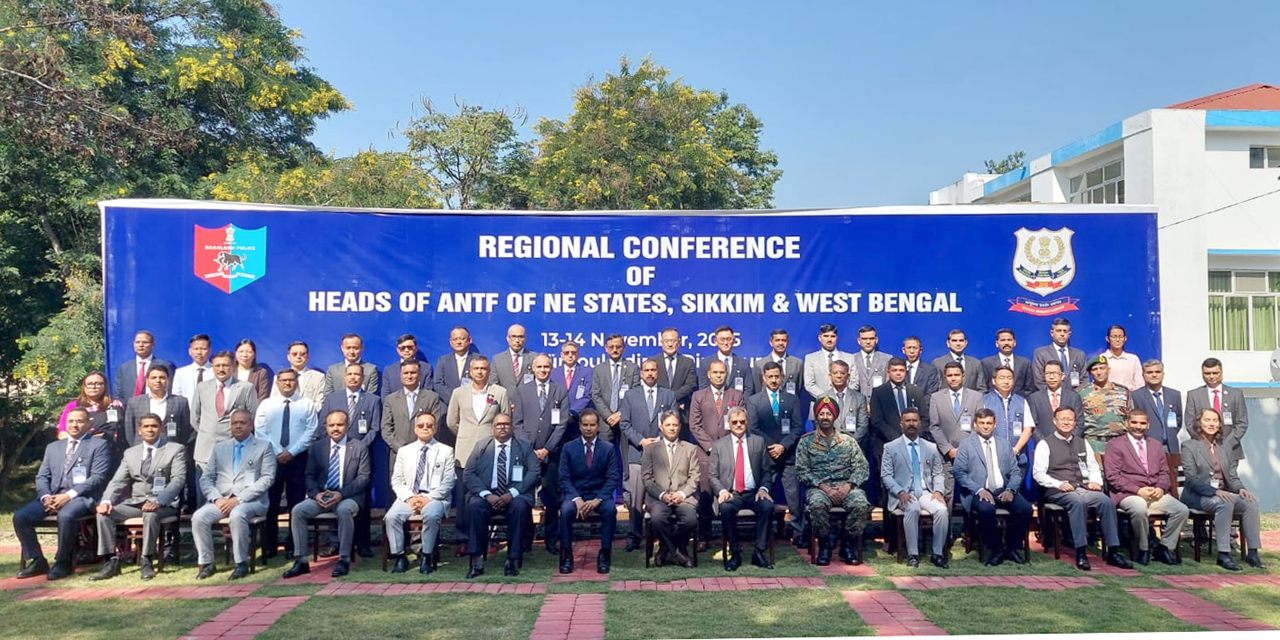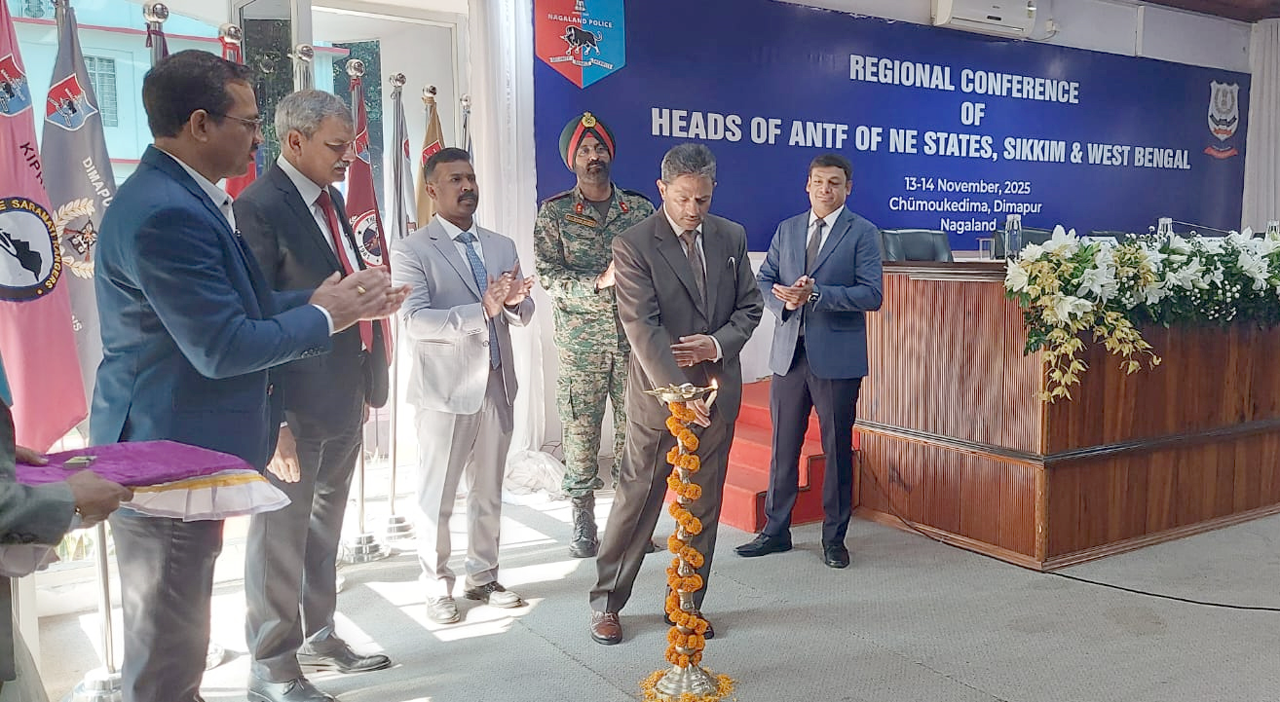Nagaland Director General of Police (DGP) Rupin Sharma has raised a strong alarm over the rising narcotics crisis in the Northeast, describing it as a “public health emergency” and a “direct threat to India’s internal security.”
Addressing the Regional Conference of Heads of Anti-Narcotics Task Forces (ANTF) of Northeast States, Sikkim, and West Bengal in Dimapur, Sharma called for an integrated, intelligence-driven, and technology-led strategy to dismantle cross-border drug networks operating through the region.
Standing in for the Union Home Secretary, Sharma welcomed senior officers from the Narcotics Control Bureau (NCB), Assam Rifles, BSF, CRPF, SSB, and representatives from the northeastern states. He expressed gratitude to NCB Director General Anurag Garg for his partnership in organizing the conference and emphasized that the gathering marks a milestone in the Northeast’s collective fight against drug trafficking and abuse.
Sharma underscored that the Northeast is the epicenter of India’s battle against narcotics because of its proximity to the Golden Triangle—the world’s largest opium-producing region covering parts of Myanmar, Laos, and Thailand. “We are facing a sustained and systematic assault on India’s public health. It is silently exterminating an entire generation,” he warned.
Citing the 1,643-km long porous Indo-Myanmar border, he said it allows unfettered movement of traffickers who exploit ethnic linkages and unfenced terrain. “The situation in Myanmar has worsened post-2021 coup, and the region has become a major source of heroin and methamphetamine. This makes Nagaland, Manipur, and Mizoram particularly vulnerable,” he observed.
Presenting alarming figures, Sharma said Nagaland alone has around 1.2 lakh drug users, mostly consuming heroin and brown sugar, locally known as Shan Flower. “If we estimate a 0.5 gram of consumption per person per day, and even if we take consumers as half of the actual numbers, which I have said is 1.2 lakh for Nagaland, we are looking at almost 30,000 grams or 30 kgs per day or a whopping 10,000 kgs per annum being consumed in Nagaland alone,” he revealed.
“If we extrapolate this to 10 lakh users in the Northeastern states alone, the figure comes to almost 1 lakh kgs per annum,” he said adding it is a staggering figure, when compared to the 5,000 kilograms seized in total by all agencies combined.
The DGP noted that the economic cost of this consumption runs into thousands of crores of rupees annually, besides the massive burden on law enforcement, healthcare, and rehabilitation systems.
Calling coordination the “Achilles’ heel” of enforcement, Sharma said, “While law enforcement works within jurisdictional limits, traffickers do not. Unless we build seamless coordination among states and agencies, we will keep chasing shadows.”
He proposed that all arrests involving large or medium quantities of narcotics be followed up with joint interrogations within 24 hours using video conferencing to establish linkages across states. “We must move from a ‘need to share’ to a ‘duty to share’ model,” he stressed.
He urged that agencies must jointly target the “kingpins and financiers” behind the drug networks instead of focusing only on couriers or small-time peddlers. “Following the money trail is the most effective way of crippling cartels. We must form specialized squads dedicated to tracking hawala channels, mule bank accounts, and financial networks that sustain this trade,” he said.
He further underlined the need for law enforcement to adopt modern technology — from digital forensics and darknet monitoring to cryptocurrency tracking and big data analysis. “Every state ANTF must have dedicated, centrally trained, specialized units. The days of relying solely on human intelligence are over,” he asserted.
The DGP also announced that Nagaland Police has developed automatic number plate recognition (ANPR) systems and vehicle databases on trafficking routes. “We can help other states trace suspected vehicles transiting through Nagaland into Manipur and Assam,” he said, adding that facial recognition systems are being integrated to strengthen surveillance.
Download Nagaland Tribune app on Google Play

Rupin Sharma also raised concerns about coordination gaps between de-addiction centers and law enforcement. “The veil of privacy should be balanced with the right to life and public safety. De-addiction centers must share information about supply chains and drug networks,” he said, citing the Supreme Court’s Puttaswamy judgment.
Stating that influx of synthetic drugs, particularly meth, yaba tablets etc is rising rapidly, the DGP said, “We must remain highly vigilant using drone and satellite mapping to identify and destroy nascent illicit cultivation of poppy in certain tracts of Myanmar and Arunachal.”
He proposed the establishment of a dedicated Northeast Anti-Drug Trafficking Authority, headed by a senior police officer, to strengthen interstate cooperation. He also called for reforms to the NDPS Act, including recognition of conspiracy to traffic as a separate offence, statutory provisions for plea bargaining, and witness protection within the Act itself.
“Financial investigation is the most effective way of crippling the cartels,” Sharma said, urging states to form specialized squads to trace hawala links, freeze mule accounts, and analyze banking data. “Banks must operate a 24×7 law enforcement interface, just like telecom providers. Their current 9-to-6 setup is outdated.”
Sharma acknowledged that attachment and forfeiture of properties are culturally sensitive in the region but insisted they are necessary deterrents. He also cautioned that preventive detention laws must be used judiciously: “Excessive use is a sign of a failed criminal justice system, while non-use makes us toothless.”
On capacity building, Sharma revealed that Nagaland Police is collaborating with NIT Mizoram to develop an AI-based transcription system for lawful intercepts in multiple languages. He also announced the creation of a regional database of suspects, financiers, couriers, and vehicles, accessible to all northeastern states and the NCB.
Sharma flagged inconsistencies in the application of the PIT-NDPS Act across states and called for standardized procedures and timelines. Referring to a recent Supreme Court ruling that mandates translation of arrest documents in local languages, he said the directive poses “a practical challenge” in a linguistically diverse region.
He also urged for closer engagement between law enforcement, prosecution, forensics, and the judiciary. “Our investigators and prosecutors often falter at the final stage. We need a joint workshop involving all stakeholders to align understanding and practices,” he said.
“Our battle against drugs must be fought with coordination, compassion, and conviction,” he said.

NCB Chief warns of rising narco-threat from Northeast
Director General of the Narcotics Control Bureau (NCB), Anurag Garg, has warned that drug trafficking and abuse have become major national security challenges, fuelling organized crime, terrorism financing, and money laundering.
Garg said the issue has grave consequences for both national security and public health.
“The money generated through drug trafficking is channeled into criminal networks, including arms trade and terror financing,” he said, adding that easy access to drugs was tearing families apart and burdening the healthcare system. Garg also noted that the Northeast records drug consumption rates far above the national average, highlighting the urgent need for coordinated action.
Emphasizing the need for stronger collaboration among law enforcement and intelligence agencies, the NCB chief said that Anti-Narcotics Task Forces (ANTFs) in all states now form the first line of defence against narcotics trafficking. “NCB’s role as the national nodal agency is to ensure this coordination and support the states in combating the threat collectively,” he said.
Garg pointed out that following the Taliban takeover in Afghanistan, Myanmar has emerged as the world’s largest producer of heroin and methamphetamine, turning the region into a major source and transit route for narcotics entering India. He thanked the Nagaland Police and State Government for hosting the conference and said the deliberations would help evolve a common strategy to tackle drug trafficking in the region.
“The Northeast requires special attention due to its proximity to the Golden Triangle and the porous Indo-Myanmar border,” he said. “I am confident that this conference will strengthen cooperation and move us closer to our shared vision of a Drug-Free India by 2047.”
The two-day conference is being attended by officials from the Narcotics Control Bureau (NCB), Ministry of Social Justice and Empowerment (MoSJE), and police departments from all the Northeastern states, Sikkim and West Bengal.

